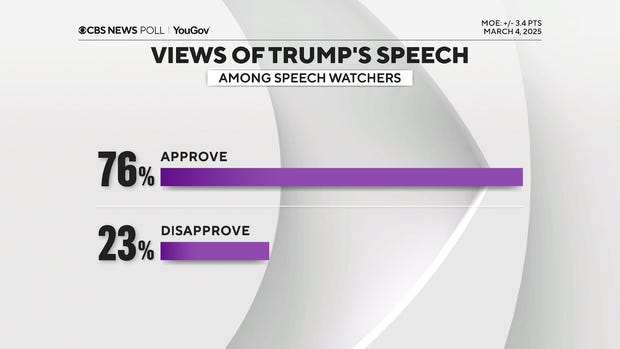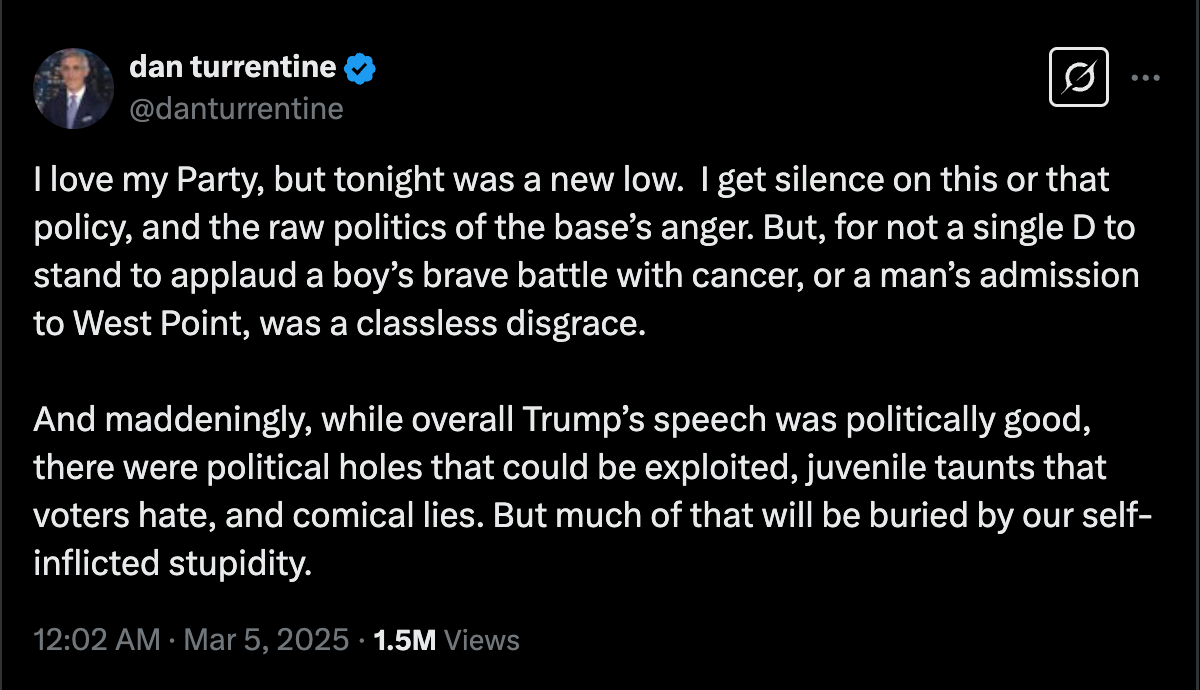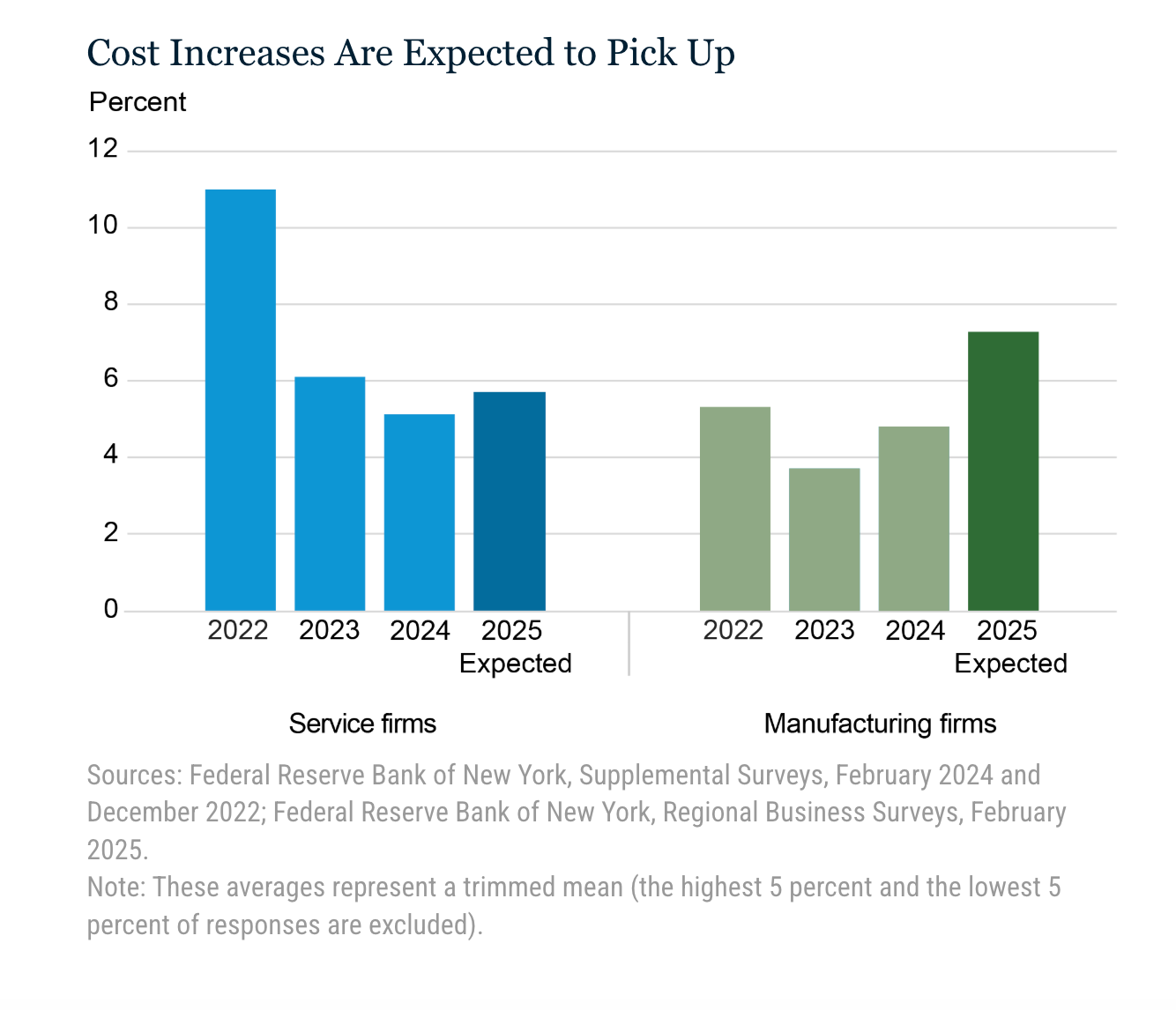March 5: We’re All Living in Trump’s World
Trump to build ships, kill CHIPS; SCOTUS: Secret negotiations with Hamas?; Slop of the Day
The Big Story
Last night, Donald Trump delivered his first State of the Union address of his new presidential term, and his fifth overall. If you didn’t watch but read the headlines this morning, you might have gotten the impression that it was angry, “defiant,” and “90 Minutes of Bad Moments,” to quote the headline of The New York Times’ poll of nine professional columnists.
In reality, though the speech was certainly “partisan” and arguably too long, it was likely the most successful speech of Trump’s political career. A CBS/YouGov poll tells the story:
Some caution in interpreting that result: 51% of speech watchers in the poll identified as Republicans, 27% as Independents, and 20% as Democrats, so this was not a random sample of the American electorate. Presumably, most of those who hate Trump did not want to watch him take a victory lap for upwards of an hour and a half.
Still, the State of the Union offered a fairly accurate capsule summary of American politics right now. Trump and his administration are broadly popular, while the Democrats, to borrow a phrase, can’t tell their ass from a hole in the ground. Trump hammered issue after issue on which his administration enjoys 60-40, 70-30, or even 80-20 support, including from millions of Americans who despise him personally and would never vote for him. He started with his strongest issue, the border, noting that illegal border crossing had dropped to the lowest level “ever recorded.” (This prompted an unintentionally funny “fact-check” from CNN, which noted that “there were fewer Border Patrol encounters with migrants at the southwest border in some of the months of the early 1960s.” Got him!) He went on to highlight his rollback of DEI initiatives, his efforts to expand domestic energy production, his moves to ban transgender women from competing in women’s sports, and his push to slash federal spending via the Department of Government Efficiency, which led to some of the best laugh lines of the night:
Democrats, meanwhile, were stuck between impotent protest—Rep. Al Green (D-TX) was ejected for heckling about four minutes into the speech—and silence. Early in the speech, Trump said of his opposition, “There’s nothing I can do to make them stand or smile or applaud,” and the Democrats went about proving him right. The entire caucus remained seated throughout the evening, even when Trump recognized a young man’s admission into West Point and deputized a 13-year-old African American brain cancer survivor as an honorary agent of the Secret Service. As the former Democratic operative Dan Turrentine wrote on X:
For the moment, at least, the speech was a reminder that despite the daily static of the digital news cycle, it’s still Trump’s world, and the rest of us are living in it.
IN THE BACK PAGES: Is Trump pulling a “Reverse Kissinger” with Russia and China? No, says Lee Smith—he’s Reversing Kissinger.
The Rest
→Trump also made a few policy announcements during the speech, including that he intends to sign an executive order to revive American shipbuilding and that he wants Congress to kill the 2022 CHIPS Act, which provides $56 billion in subsidies to promote domestic semiconductor manufacturing. Regarding the former, a draft of the order reviewed by The Wall Street Journal “includes 18 measures ranging from raising revenue from fees on Chinese-built ships and cranes entering the U.S., to establishing a new office at the National Security Council to strengthen the domestic maritime sector”; currently, about 30% of global containerships and about 70% of new ships on order come from China. On the latter, Trump derided the CHIPS Act as a “horrible, horrible thing” and urged House Speaker Mike Johnson (R-LA) to cut whatever remains of it and use the savings to “reduce debt or any other reason,” per Bloomberg. Trump has long criticized the act—he characterized it as a handout to “rich companies” in his preelection interview with Joe Rogan—and claimed that his tariffs will be a more effective means of inducing semiconductor manufacturers to invest in U.S. production. He may have a point. Thanks to last-minute lobbying from the U.S. semiconductor industry, the CHIPS Act allowed the Department of Commerce to “grant exemptions from the law’s prohibitions on recipient firms investing in manufacturing facilities in China,” thus undermining the entire strategic rationale of the bill, as Julius Krein explained in American Affairs shortly after the act’s passage.
Read more here: https://americanaffairsjournal.org/2022/08/where-the-chips-fell/
→In a 5-4 ruling on Wednesday, the Supreme Court declined to suspend a lower-court restraining order requiring the Trump administration to continue disbursing nearly $2 billion in foreign aid funding from the State Department and the U.S. Agency for International Development. Two conservatives, Chief Justice John Roberts and Justice Amy Coney Barrett, joined with the court’s liberals in denying the government’s application to vacate the lower-court ruling, ostensibly on the grounds that the payments are for work already completed by businesses and nonprofits contracting with the State Department and USAID. In a dissenting opinion, however, a “stunned” Justice Samuel Alito characterized the majority as ruling, in effect, that a “single district-court judge who likely lacks jurisdiction [has] the unchecked power to compel the Government of the United States to pay out (and probably lose forever) 2 billion taxpayer dollars.”
→The Trump administration is holding secret “direct talks with Hamas over the release of U.S. hostages in Gaza and the possibility of a broader deal to end the war,” according to a Wednesday report in Axios. Citing “two sources with direct knowledge,” Barak Ravid reports that U.S. hostage envoy Adam Boehler met with representatives of Hamas last week in Doha—the first-ever direct negotiation between a U.S. official and members of the terrorist group. The discussion included talk of a deal to “release all the remaining hostages and reach a long-term truce,” though details remain scarce and no deal has been reached. On Wednesday, meanwhile, Eyal Zamir was sworn in as the new IDF chief of staff. Zamir, who has been connected in press reports with alleged IDF plans for a renewed offensive in Gaza, said in a speech that while Hamas received a “heavy blow,” it has “not yet been defeated.” He pledged to “lead the IDF to victory,” The Times of Israel reports.
→The White House announced Wednesday afternoon that automakers would get a one month exemption from the 25% tariffs levied yesterday on Canada and Mexico, provided that they comply with the terms of the United States-Mexico-Canada free trade agreement. Stocks had tumbled on Tuesday following the imposition of the tariffs, with the S&P 500 finishing the day having erased its year-to-date gains, but the Dow Jones industrial average surged 500 points on the news of the tariffs pause. Following comments Wednesday morning from Commerce Secretary Howard Lutnick that Trump was “listening to the offers from Mexico and Canada” and “thinking about doing something in the middle,” White House Press Secretary Karoline Leavitt said Wednesday afternoon, while announcing the auto tariff reprieve, that Trump is open to additional tariff exemptions. That should come as good news to nervous American businesses; as the New York Fed’s blog, Liberty Street Economics, noted this morning, recent Fed business surveys have found that manufacturing firms, in particular, are expecting a steep increase in inflation this year:
→Grok Slop of the Day:
Isn’t that nice?
→Google is lobbying the Trump Department of Justice to abandon its efforts to break up the company, according to a Tuesday report in Bloomberg. The antitrust case against Google was launched in October 2020, during the waning months of the first Trump administration, and continued under the Biden administration. In August 2024, a federal judge ruled that Google (really, its parent company, Alphabet) had violated federal antitrust laws in monopolizing online search, and in November, the DOJ proposed a remedy: that Google be forced to sell Chrome, the world’s most popular web browser. Last week, Bloomberg reports, representatives from the company met with DOJ officials to argue that “Google’s critical importance to the U.S. economy and national security require a softer touch.” Federal court hearings on “how Google must change its practices” are set to begin in April.
SCROLL TIP LINE: Have a lead on a story or something going on in your workplace, school, congregation, or social scene that you want to tell us about? Send your tips, comments, questions, and suggestions to scroll@tabletmag.com.
Reversing Kissinger
The former Secretary of State’s 1972 opening to China badly weakened the U.S. By dispensing with that conceit, Trump shows he intends for America to win the Great Power competition.
by Lee Smith
The undiplomatic words that Donald Trump had for Ukrainian President Volodymyr Zelensky last week left some Washington, D.C. observers wondering how the Europeans saw the situation. After all, they wondered, if that’s how Trump treats a war-torn country fighting for its independence against Russian despot Vladimir Putin, what do Paris, London, and Rome, etc. think about US security commitments?
Other foreign policy analysts recognize that Trump has many audiences outside the United States, including those in Moscow and Beijing. Many of these Trump-watchers conjectured that the spectacle at the White House was meant to illustrate that Trump was willing to tilt against Ukraine in order to accommodate Putin. And the reason for that, they say, is to drive a wedge between Russia and China, what Trump sees as America’s number one threat.
The Washington foreign policy establishment is calling what it presumes to be Trump’s Russia policy “Reverse Kissinger.” That is, Trump is using the same tactic employed by Richard Nixon’s chief foreign policy aide Henry Kissinger when he encouraged his boss to open relations with the People’s Republic of China (PRC) and thereby “play the China card” against the more powerful Soviet Union. And in February 1972, Nixon went to Beijing, forging the opening with China. Trump, some are arguing, is doing the same, except going the other way.
Indeed, Kissinger himself had prophesied the coming of the “Reverse Kissinger,” for as he told Nixon only days before their fateful 1972 trip, a future American president “if he’s as wise as you, will wind up leaning towards the Russians against the Chinese.”
Kissinger reportedly suggested the idea to Trump in 2017 and the president told me for my forthcoming book on China that lots of people agreed it was a bad idea to let Russia and China get close. There were many in the administration who wanted to see if there was a way to work with Moscow to hobble Beijing, but there was no way to get around Russiagate.
The surveillance and propaganda operation managed by Barack Obama’s spy chiefs who alleged that the Trump circle had illicit ties to Russia consumed most of Trump’s first term, and made it impossible for him to engage with Putin on most meaningful issues. Thus, Russiagate was more than a Beltway scandal featuring U.S. spy services that tried to topple the government; it’s a still-unfolding national security disaster of the first order that limited the president’s ability to secure American peace and advance our prosperity.
Insofar as it kept Trump from testing the waters to see if he might split Russia from China, Russiagate was effectively a pro-CCP information operation benefiting a U.S. ruling class—including media, Big Tech, and corporate elites alongside the security services—whose wealth, power, and prestige are fruits of the opening with China. Many of those now disdainful of Trump’s initiative are deeply invested in his failure since weakening China weakens them. Naturally they’re going to say that Trump can’t pull it off—because, for among other reasons, Trump isn’t as smart as America’s most famous statesman. However, a more critical look at the opening shows that Kissinger and his boss bungled it badly.
Trump’s critics are right that there’s nothing now analogous to the fault-line underlying the 1972 opening—there’s no obvious breathing space between Moscow and Beijing like the Sino-Soviet split that drove the two communist juggernauts apart starting with the 1953 death of Josef Stalin. But Kissinger fans give him far too much credit for seizing that opportunity, when the plain fact is that he misplayed the gift that fell into his lap.
Early in Nixon’s term, Soviet diplomats asked their American counterparts how Washington would react to a Soviet nuclear attack on China—in fact, would the U.S. care to join them? The White House was horrified and leaked Moscow’s plans to deter the attack. Mao later told Kissinger he thought it was strange the Americans saw no advantage in letting their two communist rivals tear each other to pieces. Clearly that’s how Mao would have played it, because that’s how the PRC saw the opening: They were playing the American card against the Russians.
When the Chinese came running to the Americans for help, Washington by definition held the stronger position. But it was the White House that played the supplicant. For instance, during his secret July 1971 trip to Beijing to prepare for Nixon’s visit, Kissinger gifted Beijing with precious intelligence on Soviet troop movements in exchange for … agreeing to host the leader of the free world in the run-down capital of a dirt-poor third-world hellhole peopled by, at the time, nearly 900 million peasants. It would only get worse for the U.S. side, despite the great photo ops Nixon earned with his historic trip.
As the late Angelo Codevilla explained in a 2015 essay, “The Courage of His Contradictions,” Kissinger’s chief concern throughout his career as a diplomat, and then high-level consultant, was to promote an international order—in Kissinger’s view, a harmonized convergence of competing world powers designed to foster stability. His model was the Concert of Europe, the early 19th-century arrangement between various powers that kept the peace on the continent after Napoleon’s final defeat at Waterloo. But Kissinger misrepresented the nature of Europe’s concert system—the purpose was not to build an international order where every state agreed to pursue their interests in moderation; rather it was to ratify, as Codevilla wrote, “what the governments that defeated Napoleon had secured militarily.” No one wanted to fight again, at that particular moment, so they made peace, which lasted only briefly.
Accordingly, Kissinger wasn’t leveraging China against the USSR, he was trying to draw Beijing into an international order along the lines of his quasi-mystical conception of the concert system. And crucially, Kissinger’s idea of an international order based on cooperation and comity was an early advertisement for what we now call Globalism. Kissinger is its intellectual father, the theorist and apologist for the very order that the America First president opposes and seeks to undo. Accordingly, it’s more accurate to think of Trump’s overall strategy not as Reverse Kissinger but rather as Reversing Kissinger.
The typical understanding of the opening is that the move was a geopolitical masterstroke, but the U.S.-China relationship later went sour as the PRC began to cheat and failed to meet its obligations in international fora, like the World Trade Organization. Yes, obviously Beijing can’t be trusted—it’s a totalitarian police state that’s been governed by a communist party since 1949. Why Kissinger and Nixon sought friendship with a regime then engaged in another of its serial purges that cost millions of lives, the Cultural Revolution, is more evidence the opening was a mistake from the outset. For Americans then, the blame must rest entirely with the side elected to represent our interests—the U.S. political class, starting with Nixon and Kissinger.
With the end of WWII, the U.S. was primus inter pares in the Atlantic and Pacific because it won the war. But by trying to induce deadly rivals to join it in a multilateral system, the United States was offering to neuter itself. And that’s exactly what happened when Nixon met Mao.
For instance, the president hoped to get Mao’s help withdrawing from Vietnam and was prepared to be flexible on Taiwan in the exchange. The Chinese countered by informing the Americans that they’d continue to help killing their children and constituents in southeast Asia if they didn’t withdraw immediately, and then they pocketed Nixon’s virtual abandonment of Taiwan. The opening was structured to weaken the U.S. position in favor of China, and everything pursuant to it followed that logic.
With his reputation as the Marco Polo of Globalism firmly established through his public sector work, Kissinger’s job in the private sector was to help get U.S. companies into the enormous Chinese market with nearly a billion potential consumers. According to Kissinger—and the dozens, then hundreds, then thousands of Kissinger clones that came after—it was to be the heyday of U.S.-China trade. Except the Americans knew that dating back 200 years there had never really been a Chinese market for U.S. goods, except for opium. In fact, what the big U.S. corporate bosses really wanted was to replace American workers with China’s huge pool of cheap labor by offshoring manufacturing. And thus began the purposeful impoverishment of the U.S. middle class, what Trump calls American carnage.
This is what Trump is trying to undo with his protectionist policies, like his now 20% tariff on Chinese goods. Making America great again requires protecting American workers and our industrial base—our national security and national character depend on it. Thus, his strategic goal is to reverse the devastation of the heartland that began with Kissinger. And it seems he believes that trying to pull Putin away from Xi Jinping is a useful tactic in that larger effort. Who knows if he’ll succeed, but the fact is that unlike Kissinger, Trump isn’t playing for a tie. He intends to win.









Extraordinarily fascinating and insightful article, “ “Reversing Kissinger” by Lee Smith!!
Positively a must read!
Great analysis, Lee Smith.